Comprehensive Geriatric Assessment and Interview: Module 2 Nursing
VerifiedAdded on 2022/08/26
|9
|2239
|15
Practical Assignment
AI Summary
This assignment details a comprehensive geriatric assessment of an 80-year-old woman, Mrs. JK, conducted for a nursing module. The assessment included a therapeutic interview exploring her demographics, life history, significant life events, coping mechanisms, and personal strengths. Various assessment tools were employed, such as the Geriatric Depression Scale, Fulmer SPICES, Mini-Mental State Exam, and a patient stress questionnaire, and the findings from each tool were meticulously reported. The assignment also included an analysis of Mrs. JK's level of ego integrity versus despair based on Erik Erikson's psychosocial stages, rating her at a 10. Based on the assessment, two nursing diagnoses were formulated: risk of depression and self-care deficit, along with corresponding goals and interventions. The interventions focused on patient education, family involvement, and medication management to improve the patient's well-being and independence.
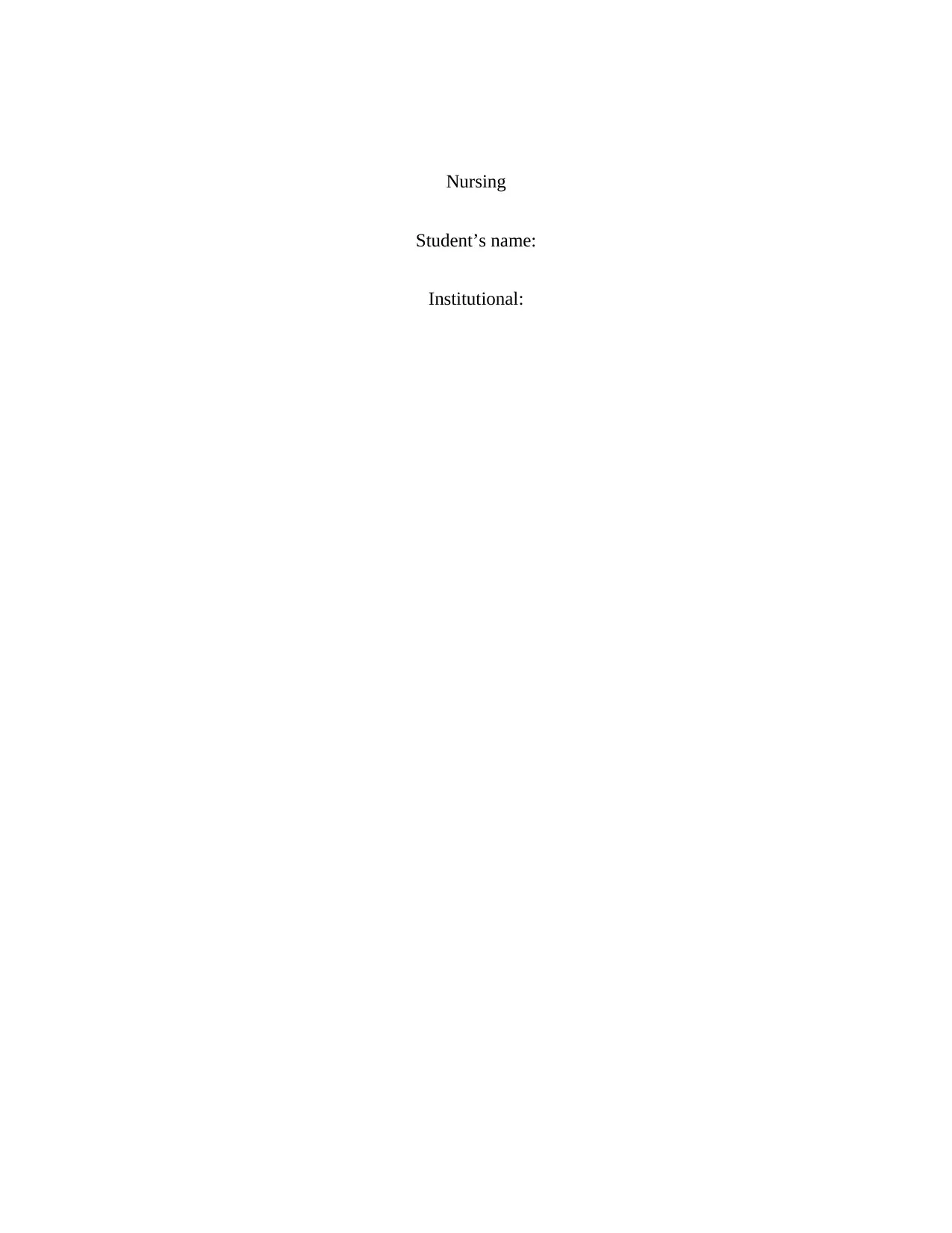
Nursing
Student’s name:
Institutional:
Student’s name:
Institutional:
Paraphrase This Document
Need a fresh take? Get an instant paraphrase of this document with our AI Paraphraser
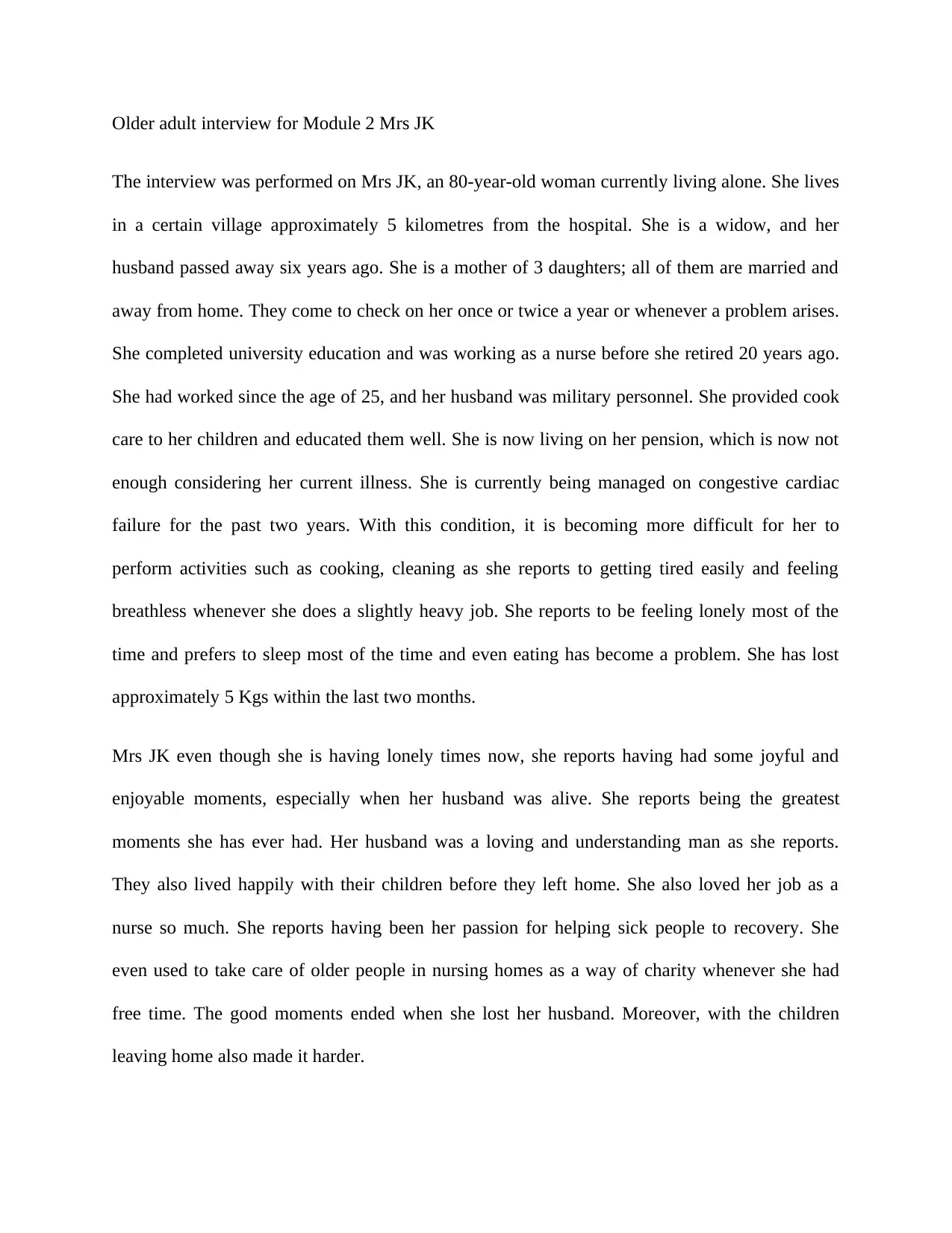
Older adult interview for Module 2 Mrs JK
The interview was performed on Mrs JK, an 80-year-old woman currently living alone. She lives
in a certain village approximately 5 kilometres from the hospital. She is a widow, and her
husband passed away six years ago. She is a mother of 3 daughters; all of them are married and
away from home. They come to check on her once or twice a year or whenever a problem arises.
She completed university education and was working as a nurse before she retired 20 years ago.
She had worked since the age of 25, and her husband was military personnel. She provided cook
care to her children and educated them well. She is now living on her pension, which is now not
enough considering her current illness. She is currently being managed on congestive cardiac
failure for the past two years. With this condition, it is becoming more difficult for her to
perform activities such as cooking, cleaning as she reports to getting tired easily and feeling
breathless whenever she does a slightly heavy job. She reports to be feeling lonely most of the
time and prefers to sleep most of the time and even eating has become a problem. She has lost
approximately 5 Kgs within the last two months.
Mrs JK even though she is having lonely times now, she reports having had some joyful and
enjoyable moments, especially when her husband was alive. She reports being the greatest
moments she has ever had. Her husband was a loving and understanding man as she reports.
They also lived happily with their children before they left home. She also loved her job as a
nurse so much. She reports having been her passion for helping sick people to recovery. She
even used to take care of older people in nursing homes as a way of charity whenever she had
free time. The good moments ended when she lost her husband. Moreover, with the children
leaving home also made it harder.
The interview was performed on Mrs JK, an 80-year-old woman currently living alone. She lives
in a certain village approximately 5 kilometres from the hospital. She is a widow, and her
husband passed away six years ago. She is a mother of 3 daughters; all of them are married and
away from home. They come to check on her once or twice a year or whenever a problem arises.
She completed university education and was working as a nurse before she retired 20 years ago.
She had worked since the age of 25, and her husband was military personnel. She provided cook
care to her children and educated them well. She is now living on her pension, which is now not
enough considering her current illness. She is currently being managed on congestive cardiac
failure for the past two years. With this condition, it is becoming more difficult for her to
perform activities such as cooking, cleaning as she reports to getting tired easily and feeling
breathless whenever she does a slightly heavy job. She reports to be feeling lonely most of the
time and prefers to sleep most of the time and even eating has become a problem. She has lost
approximately 5 Kgs within the last two months.
Mrs JK even though she is having lonely times now, she reports having had some joyful and
enjoyable moments, especially when her husband was alive. She reports being the greatest
moments she has ever had. Her husband was a loving and understanding man as she reports.
They also lived happily with their children before they left home. She also loved her job as a
nurse so much. She reports having been her passion for helping sick people to recovery. She
even used to take care of older people in nursing homes as a way of charity whenever she had
free time. The good moments ended when she lost her husband. Moreover, with the children
leaving home also made it harder.
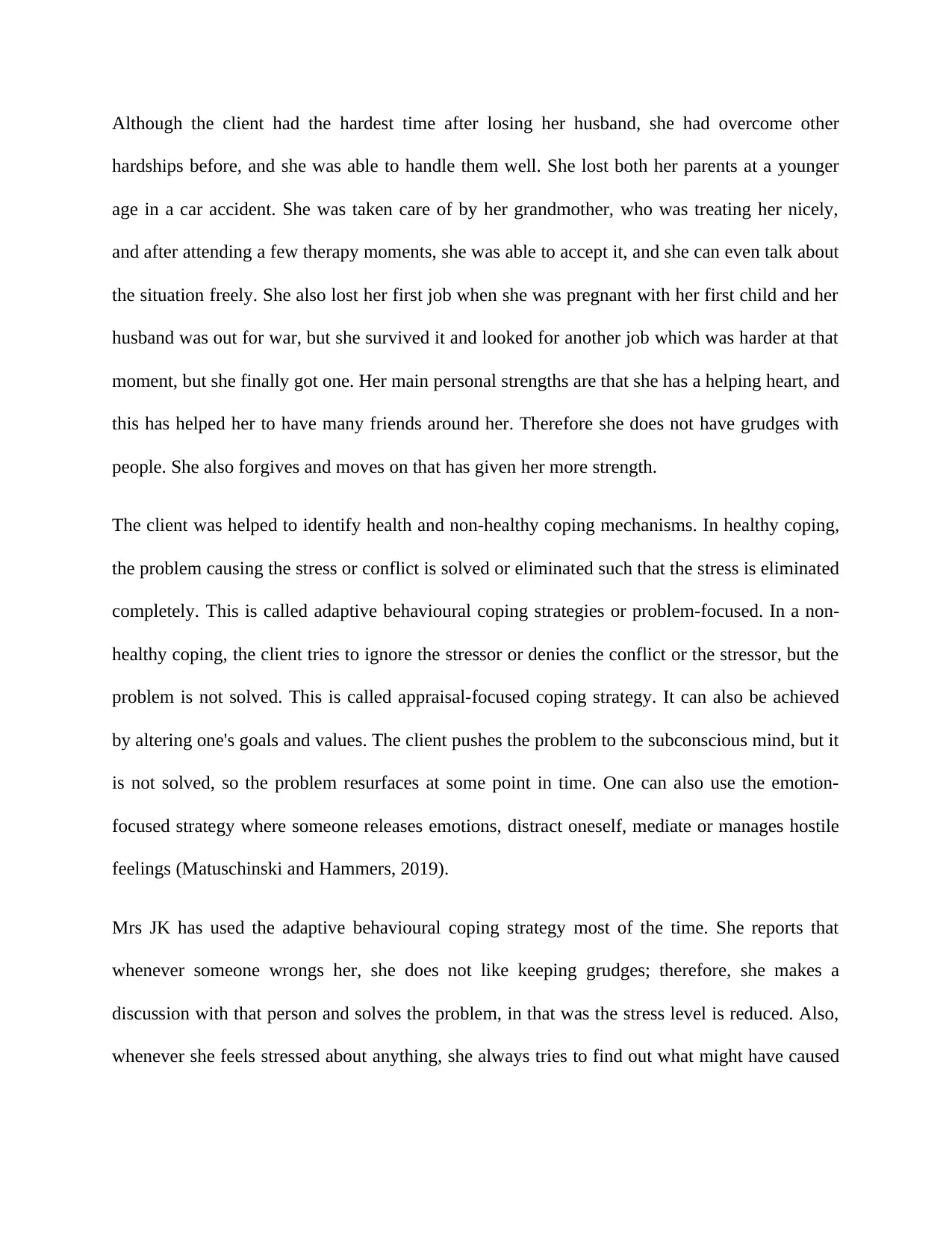
Although the client had the hardest time after losing her husband, she had overcome other
hardships before, and she was able to handle them well. She lost both her parents at a younger
age in a car accident. She was taken care of by her grandmother, who was treating her nicely,
and after attending a few therapy moments, she was able to accept it, and she can even talk about
the situation freely. She also lost her first job when she was pregnant with her first child and her
husband was out for war, but she survived it and looked for another job which was harder at that
moment, but she finally got one. Her main personal strengths are that she has a helping heart, and
this has helped her to have many friends around her. Therefore she does not have grudges with
people. She also forgives and moves on that has given her more strength.
The client was helped to identify health and non-healthy coping mechanisms. In healthy coping,
the problem causing the stress or conflict is solved or eliminated such that the stress is eliminated
completely. This is called adaptive behavioural coping strategies or problem-focused. In a non-
healthy coping, the client tries to ignore the stressor or denies the conflict or the stressor, but the
problem is not solved. This is called appraisal-focused coping strategy. It can also be achieved
by altering one's goals and values. The client pushes the problem to the subconscious mind, but it
is not solved, so the problem resurfaces at some point in time. One can also use the emotion-
focused strategy where someone releases emotions, distract oneself, mediate or manages hostile
feelings (Matuschinski and Hammers, 2019).
Mrs JK has used the adaptive behavioural coping strategy most of the time. She reports that
whenever someone wrongs her, she does not like keeping grudges; therefore, she makes a
discussion with that person and solves the problem, in that was the stress level is reduced. Also,
whenever she feels stressed about anything, she always tries to find out what might have caused
hardships before, and she was able to handle them well. She lost both her parents at a younger
age in a car accident. She was taken care of by her grandmother, who was treating her nicely,
and after attending a few therapy moments, she was able to accept it, and she can even talk about
the situation freely. She also lost her first job when she was pregnant with her first child and her
husband was out for war, but she survived it and looked for another job which was harder at that
moment, but she finally got one. Her main personal strengths are that she has a helping heart, and
this has helped her to have many friends around her. Therefore she does not have grudges with
people. She also forgives and moves on that has given her more strength.
The client was helped to identify health and non-healthy coping mechanisms. In healthy coping,
the problem causing the stress or conflict is solved or eliminated such that the stress is eliminated
completely. This is called adaptive behavioural coping strategies or problem-focused. In a non-
healthy coping, the client tries to ignore the stressor or denies the conflict or the stressor, but the
problem is not solved. This is called appraisal-focused coping strategy. It can also be achieved
by altering one's goals and values. The client pushes the problem to the subconscious mind, but it
is not solved, so the problem resurfaces at some point in time. One can also use the emotion-
focused strategy where someone releases emotions, distract oneself, mediate or manages hostile
feelings (Matuschinski and Hammers, 2019).
Mrs JK has used the adaptive behavioural coping strategy most of the time. She reports that
whenever someone wrongs her, she does not like keeping grudges; therefore, she makes a
discussion with that person and solves the problem, in that was the stress level is reduced. Also,
whenever she feels stressed about anything, she always tries to find out what might have caused
⊘ This is a preview!⊘
Do you want full access?
Subscribe today to unlock all pages.

Trusted by 1+ million students worldwide
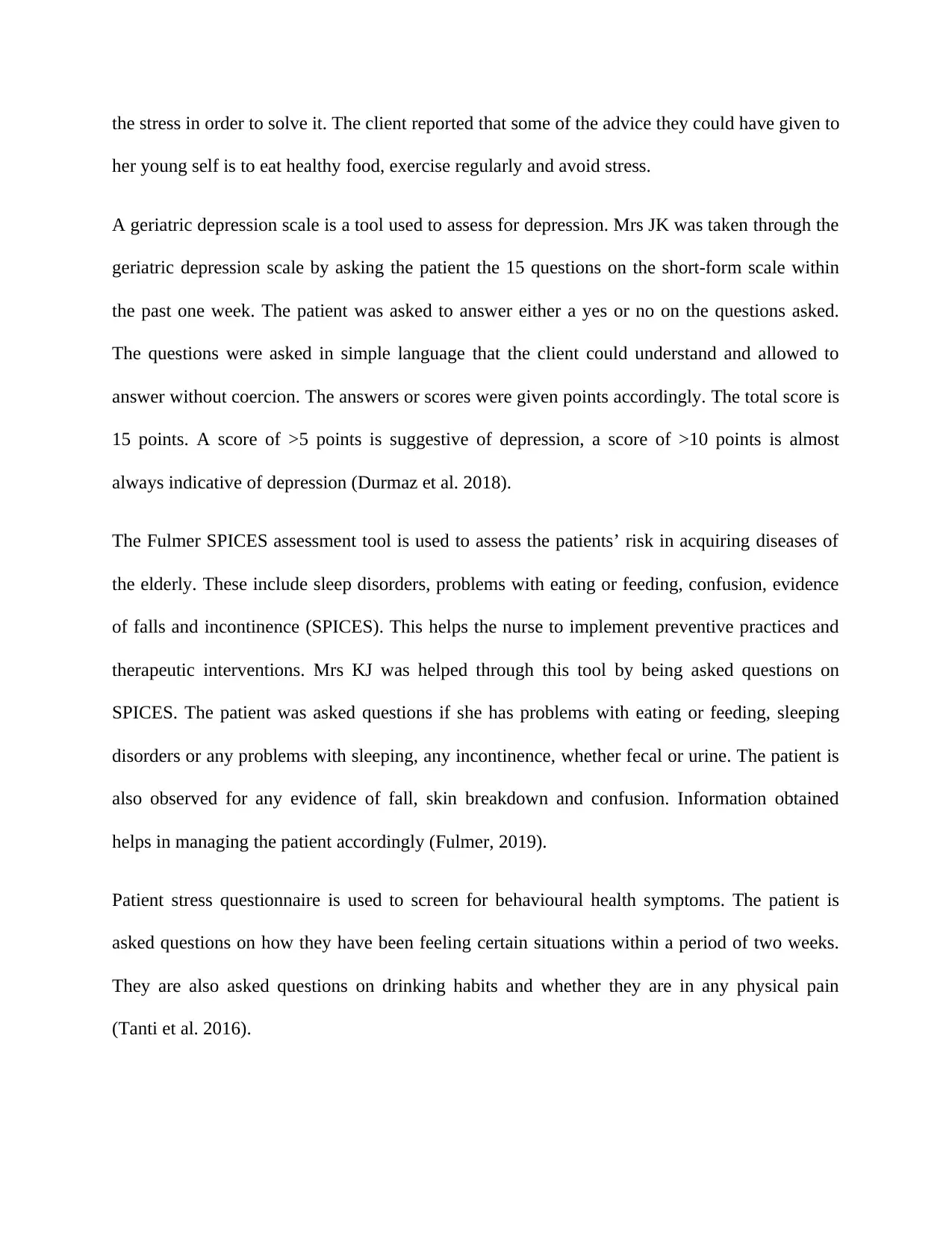
the stress in order to solve it. The client reported that some of the advice they could have given to
her young self is to eat healthy food, exercise regularly and avoid stress.
A geriatric depression scale is a tool used to assess for depression. Mrs JK was taken through the
geriatric depression scale by asking the patient the 15 questions on the short-form scale within
the past one week. The patient was asked to answer either a yes or no on the questions asked.
The questions were asked in simple language that the client could understand and allowed to
answer without coercion. The answers or scores were given points accordingly. The total score is
15 points. A score of >5 points is suggestive of depression, a score of >10 points is almost
always indicative of depression (Durmaz et al. 2018).
The Fulmer SPICES assessment tool is used to assess the patients’ risk in acquiring diseases of
the elderly. These include sleep disorders, problems with eating or feeding, confusion, evidence
of falls and incontinence (SPICES). This helps the nurse to implement preventive practices and
therapeutic interventions. Mrs KJ was helped through this tool by being asked questions on
SPICES. The patient was asked questions if she has problems with eating or feeding, sleeping
disorders or any problems with sleeping, any incontinence, whether fecal or urine. The patient is
also observed for any evidence of fall, skin breakdown and confusion. Information obtained
helps in managing the patient accordingly (Fulmer, 2019).
Patient stress questionnaire is used to screen for behavioural health symptoms. The patient is
asked questions on how they have been feeling certain situations within a period of two weeks.
They are also asked questions on drinking habits and whether they are in any physical pain
(Tanti et al. 2016).
her young self is to eat healthy food, exercise regularly and avoid stress.
A geriatric depression scale is a tool used to assess for depression. Mrs JK was taken through the
geriatric depression scale by asking the patient the 15 questions on the short-form scale within
the past one week. The patient was asked to answer either a yes or no on the questions asked.
The questions were asked in simple language that the client could understand and allowed to
answer without coercion. The answers or scores were given points accordingly. The total score is
15 points. A score of >5 points is suggestive of depression, a score of >10 points is almost
always indicative of depression (Durmaz et al. 2018).
The Fulmer SPICES assessment tool is used to assess the patients’ risk in acquiring diseases of
the elderly. These include sleep disorders, problems with eating or feeding, confusion, evidence
of falls and incontinence (SPICES). This helps the nurse to implement preventive practices and
therapeutic interventions. Mrs KJ was helped through this tool by being asked questions on
SPICES. The patient was asked questions if she has problems with eating or feeding, sleeping
disorders or any problems with sleeping, any incontinence, whether fecal or urine. The patient is
also observed for any evidence of fall, skin breakdown and confusion. Information obtained
helps in managing the patient accordingly (Fulmer, 2019).
Patient stress questionnaire is used to screen for behavioural health symptoms. The patient is
asked questions on how they have been feeling certain situations within a period of two weeks.
They are also asked questions on drinking habits and whether they are in any physical pain
(Tanti et al. 2016).
Paraphrase This Document
Need a fresh take? Get an instant paraphrase of this document with our AI Paraphraser
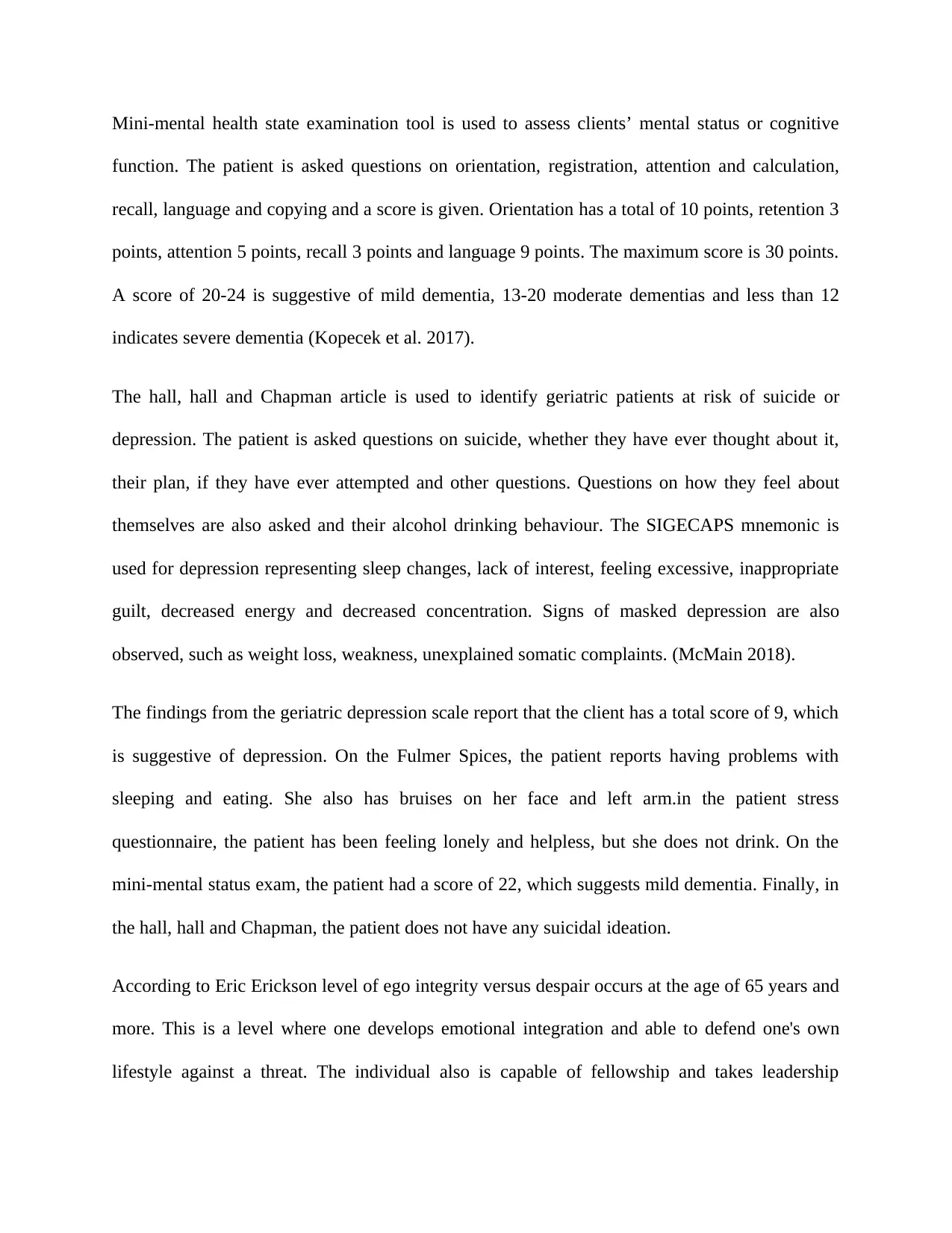
Mini-mental health state examination tool is used to assess clients’ mental status or cognitive
function. The patient is asked questions on orientation, registration, attention and calculation,
recall, language and copying and a score is given. Orientation has a total of 10 points, retention 3
points, attention 5 points, recall 3 points and language 9 points. The maximum score is 30 points.
A score of 20-24 is suggestive of mild dementia, 13-20 moderate dementias and less than 12
indicates severe dementia (Kopecek et al. 2017).
The hall, hall and Chapman article is used to identify geriatric patients at risk of suicide or
depression. The patient is asked questions on suicide, whether they have ever thought about it,
their plan, if they have ever attempted and other questions. Questions on how they feel about
themselves are also asked and their alcohol drinking behaviour. The SIGECAPS mnemonic is
used for depression representing sleep changes, lack of interest, feeling excessive, inappropriate
guilt, decreased energy and decreased concentration. Signs of masked depression are also
observed, such as weight loss, weakness, unexplained somatic complaints. (McMain 2018).
The findings from the geriatric depression scale report that the client has a total score of 9, which
is suggestive of depression. On the Fulmer Spices, the patient reports having problems with
sleeping and eating. She also has bruises on her face and left arm.in the patient stress
questionnaire, the patient has been feeling lonely and helpless, but she does not drink. On the
mini-mental status exam, the patient had a score of 22, which suggests mild dementia. Finally, in
the hall, hall and Chapman, the patient does not have any suicidal ideation.
According to Eric Erickson level of ego integrity versus despair occurs at the age of 65 years and
more. This is a level where one develops emotional integration and able to defend one's own
lifestyle against a threat. The individual also is capable of fellowship and takes leadership
function. The patient is asked questions on orientation, registration, attention and calculation,
recall, language and copying and a score is given. Orientation has a total of 10 points, retention 3
points, attention 5 points, recall 3 points and language 9 points. The maximum score is 30 points.
A score of 20-24 is suggestive of mild dementia, 13-20 moderate dementias and less than 12
indicates severe dementia (Kopecek et al. 2017).
The hall, hall and Chapman article is used to identify geriatric patients at risk of suicide or
depression. The patient is asked questions on suicide, whether they have ever thought about it,
their plan, if they have ever attempted and other questions. Questions on how they feel about
themselves are also asked and their alcohol drinking behaviour. The SIGECAPS mnemonic is
used for depression representing sleep changes, lack of interest, feeling excessive, inappropriate
guilt, decreased energy and decreased concentration. Signs of masked depression are also
observed, such as weight loss, weakness, unexplained somatic complaints. (McMain 2018).
The findings from the geriatric depression scale report that the client has a total score of 9, which
is suggestive of depression. On the Fulmer Spices, the patient reports having problems with
sleeping and eating. She also has bruises on her face and left arm.in the patient stress
questionnaire, the patient has been feeling lonely and helpless, but she does not drink. On the
mini-mental status exam, the patient had a score of 22, which suggests mild dementia. Finally, in
the hall, hall and Chapman, the patient does not have any suicidal ideation.
According to Eric Erickson level of ego integrity versus despair occurs at the age of 65 years and
more. This is a level where one develops emotional integration and able to defend one's own
lifestyle against a threat. The individual also is capable of fellowship and takes leadership
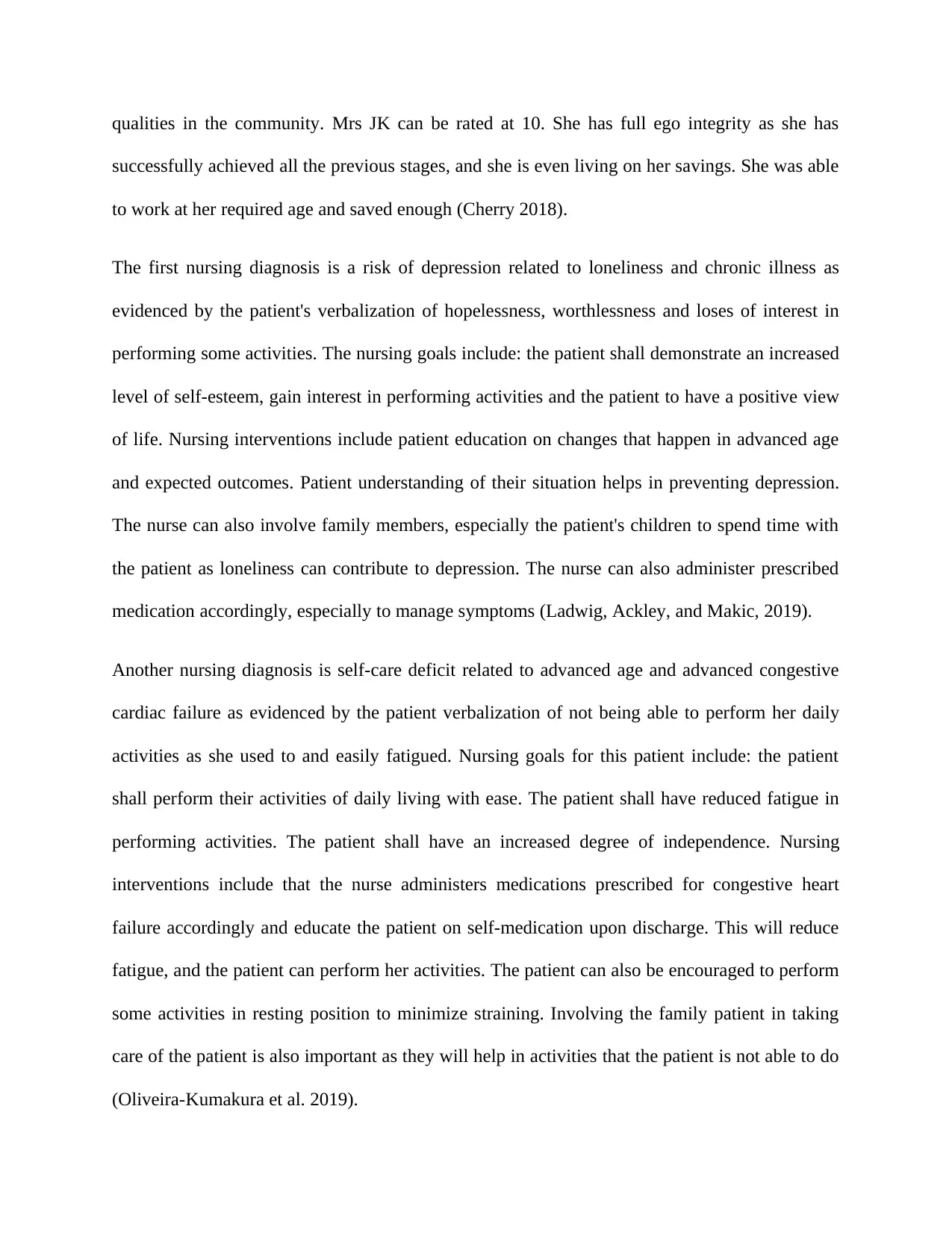
qualities in the community. Mrs JK can be rated at 10. She has full ego integrity as she has
successfully achieved all the previous stages, and she is even living on her savings. She was able
to work at her required age and saved enough (Cherry 2018).
The first nursing diagnosis is a risk of depression related to loneliness and chronic illness as
evidenced by the patient's verbalization of hopelessness, worthlessness and loses of interest in
performing some activities. The nursing goals include: the patient shall demonstrate an increased
level of self-esteem, gain interest in performing activities and the patient to have a positive view
of life. Nursing interventions include patient education on changes that happen in advanced age
and expected outcomes. Patient understanding of their situation helps in preventing depression.
The nurse can also involve family members, especially the patient's children to spend time with
the patient as loneliness can contribute to depression. The nurse can also administer prescribed
medication accordingly, especially to manage symptoms (Ladwig, Ackley, and Makic, 2019).
Another nursing diagnosis is self-care deficit related to advanced age and advanced congestive
cardiac failure as evidenced by the patient verbalization of not being able to perform her daily
activities as she used to and easily fatigued. Nursing goals for this patient include: the patient
shall perform their activities of daily living with ease. The patient shall have reduced fatigue in
performing activities. The patient shall have an increased degree of independence. Nursing
interventions include that the nurse administers medications prescribed for congestive heart
failure accordingly and educate the patient on self-medication upon discharge. This will reduce
fatigue, and the patient can perform her activities. The patient can also be encouraged to perform
some activities in resting position to minimize straining. Involving the family patient in taking
care of the patient is also important as they will help in activities that the patient is not able to do
(Oliveira-Kumakura et al. 2019).
successfully achieved all the previous stages, and she is even living on her savings. She was able
to work at her required age and saved enough (Cherry 2018).
The first nursing diagnosis is a risk of depression related to loneliness and chronic illness as
evidenced by the patient's verbalization of hopelessness, worthlessness and loses of interest in
performing some activities. The nursing goals include: the patient shall demonstrate an increased
level of self-esteem, gain interest in performing activities and the patient to have a positive view
of life. Nursing interventions include patient education on changes that happen in advanced age
and expected outcomes. Patient understanding of their situation helps in preventing depression.
The nurse can also involve family members, especially the patient's children to spend time with
the patient as loneliness can contribute to depression. The nurse can also administer prescribed
medication accordingly, especially to manage symptoms (Ladwig, Ackley, and Makic, 2019).
Another nursing diagnosis is self-care deficit related to advanced age and advanced congestive
cardiac failure as evidenced by the patient verbalization of not being able to perform her daily
activities as she used to and easily fatigued. Nursing goals for this patient include: the patient
shall perform their activities of daily living with ease. The patient shall have reduced fatigue in
performing activities. The patient shall have an increased degree of independence. Nursing
interventions include that the nurse administers medications prescribed for congestive heart
failure accordingly and educate the patient on self-medication upon discharge. This will reduce
fatigue, and the patient can perform her activities. The patient can also be encouraged to perform
some activities in resting position to minimize straining. Involving the family patient in taking
care of the patient is also important as they will help in activities that the patient is not able to do
(Oliveira-Kumakura et al. 2019).
⊘ This is a preview!⊘
Do you want full access?
Subscribe today to unlock all pages.

Trusted by 1+ million students worldwide

Paraphrase This Document
Need a fresh take? Get an instant paraphrase of this document with our AI Paraphraser
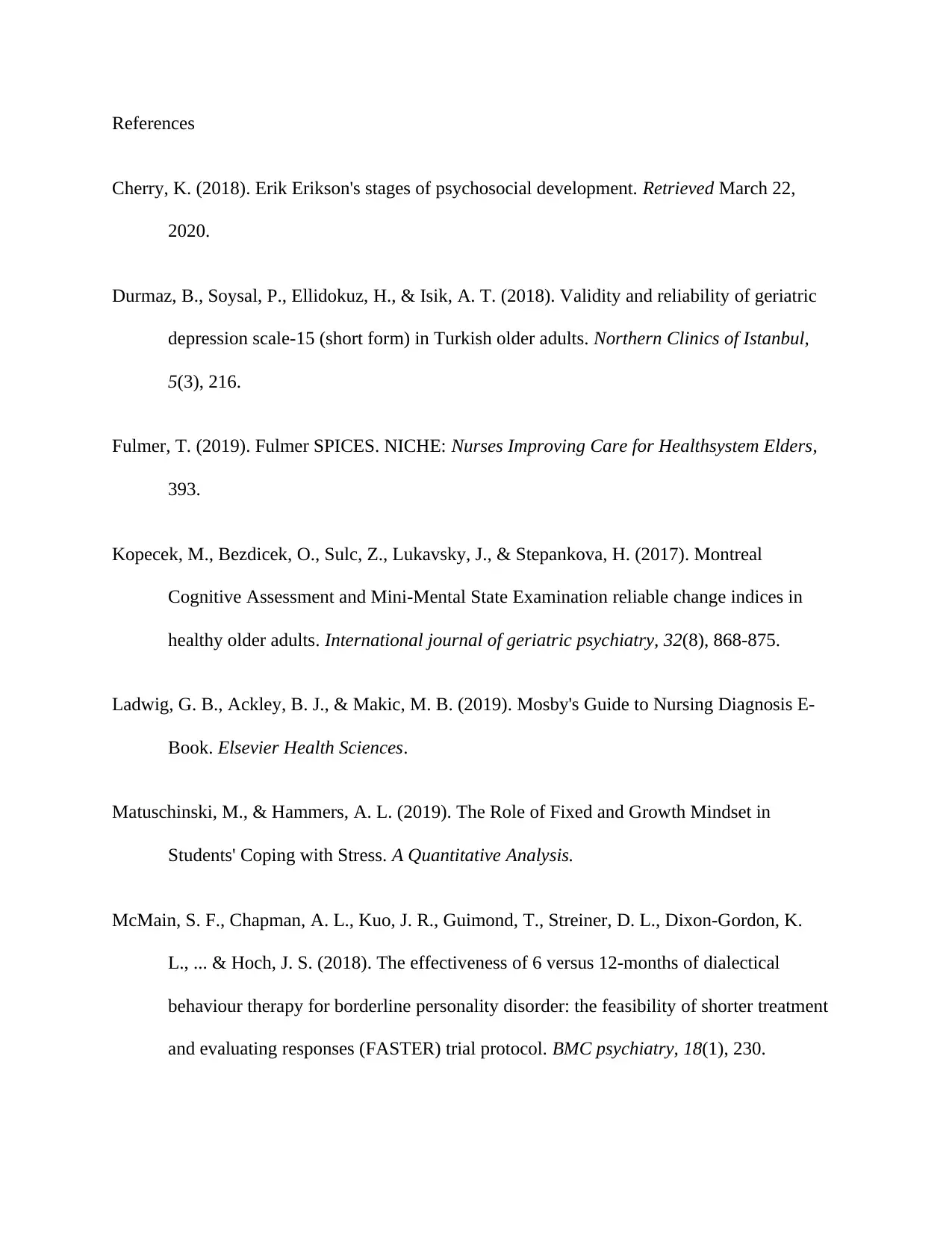
References
Cherry, K. (2018). Erik Erikson's stages of psychosocial development. Retrieved March 22,
2020.
Durmaz, B., Soysal, P., Ellidokuz, H., & Isik, A. T. (2018). Validity and reliability of geriatric
depression scale-15 (short form) in Turkish older adults. Northern Clinics of Istanbul,
5(3), 216.
Fulmer, T. (2019). Fulmer SPICES. NICHE: Nurses Improving Care for Healthsystem Elders,
393.
Kopecek, M., Bezdicek, O., Sulc, Z., Lukavsky, J., & Stepankova, H. (2017). Montreal
Cognitive Assessment and Mini‐Mental State Examination reliable change indices in
healthy older adults. International journal of geriatric psychiatry, 32(8), 868-875.
Ladwig, G. B., Ackley, B. J., & Makic, M. B. (2019). Mosby's Guide to Nursing Diagnosis E-
Book. Elsevier Health Sciences.
Matuschinski, M., & Hammers, A. L. (2019). The Role of Fixed and Growth Mindset in
Students' Coping with Stress. A Quantitative Analysis.
McMain, S. F., Chapman, A. L., Kuo, J. R., Guimond, T., Streiner, D. L., Dixon-Gordon, K.
L., ... & Hoch, J. S. (2018). The effectiveness of 6 versus 12-months of dialectical
behaviour therapy for borderline personality disorder: the feasibility of shorter treatment
and evaluating responses (FASTER) trial protocol. BMC psychiatry, 18(1), 230.
Cherry, K. (2018). Erik Erikson's stages of psychosocial development. Retrieved March 22,
2020.
Durmaz, B., Soysal, P., Ellidokuz, H., & Isik, A. T. (2018). Validity and reliability of geriatric
depression scale-15 (short form) in Turkish older adults. Northern Clinics of Istanbul,
5(3), 216.
Fulmer, T. (2019). Fulmer SPICES. NICHE: Nurses Improving Care for Healthsystem Elders,
393.
Kopecek, M., Bezdicek, O., Sulc, Z., Lukavsky, J., & Stepankova, H. (2017). Montreal
Cognitive Assessment and Mini‐Mental State Examination reliable change indices in
healthy older adults. International journal of geriatric psychiatry, 32(8), 868-875.
Ladwig, G. B., Ackley, B. J., & Makic, M. B. (2019). Mosby's Guide to Nursing Diagnosis E-
Book. Elsevier Health Sciences.
Matuschinski, M., & Hammers, A. L. (2019). The Role of Fixed and Growth Mindset in
Students' Coping with Stress. A Quantitative Analysis.
McMain, S. F., Chapman, A. L., Kuo, J. R., Guimond, T., Streiner, D. L., Dixon-Gordon, K.
L., ... & Hoch, J. S. (2018). The effectiveness of 6 versus 12-months of dialectical
behaviour therapy for borderline personality disorder: the feasibility of shorter treatment
and evaluating responses (FASTER) trial protocol. BMC psychiatry, 18(1), 230.
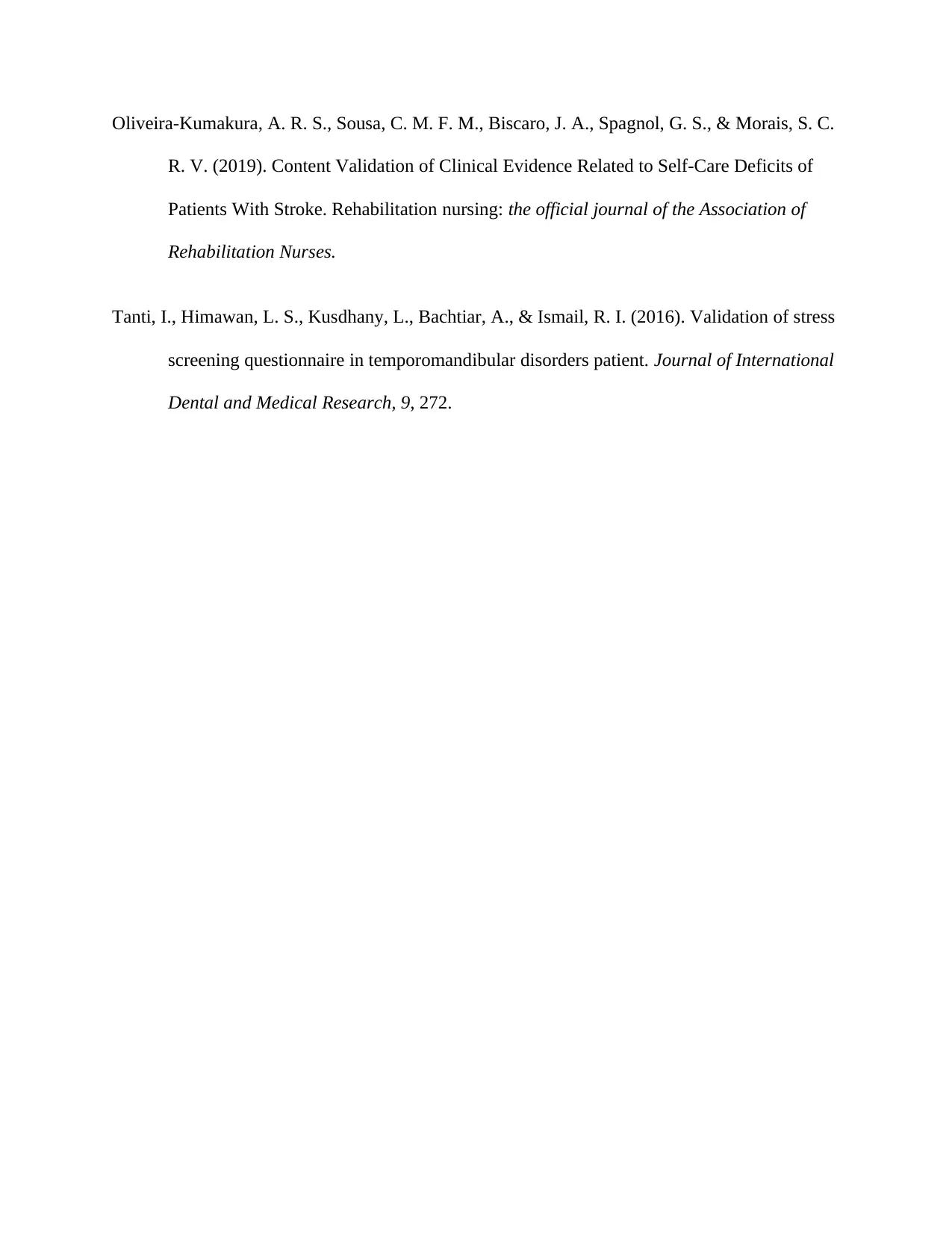
Oliveira-Kumakura, A. R. S., Sousa, C. M. F. M., Biscaro, J. A., Spagnol, G. S., & Morais, S. C.
R. V. (2019). Content Validation of Clinical Evidence Related to Self-Care Deficits of
Patients With Stroke. Rehabilitation nursing: the official journal of the Association of
Rehabilitation Nurses.
Tanti, I., Himawan, L. S., Kusdhany, L., Bachtiar, A., & Ismail, R. I. (2016). Validation of stress
screening questionnaire in temporomandibular disorders patient. Journal of International
Dental and Medical Research, 9, 272.
R. V. (2019). Content Validation of Clinical Evidence Related to Self-Care Deficits of
Patients With Stroke. Rehabilitation nursing: the official journal of the Association of
Rehabilitation Nurses.
Tanti, I., Himawan, L. S., Kusdhany, L., Bachtiar, A., & Ismail, R. I. (2016). Validation of stress
screening questionnaire in temporomandibular disorders patient. Journal of International
Dental and Medical Research, 9, 272.
⊘ This is a preview!⊘
Do you want full access?
Subscribe today to unlock all pages.

Trusted by 1+ million students worldwide
1 out of 9
Related Documents
Your All-in-One AI-Powered Toolkit for Academic Success.
+13062052269
info@desklib.com
Available 24*7 on WhatsApp / Email
![[object Object]](/_next/static/media/star-bottom.7253800d.svg)
Unlock your academic potential
Copyright © 2020–2025 A2Z Services. All Rights Reserved. Developed and managed by ZUCOL.





